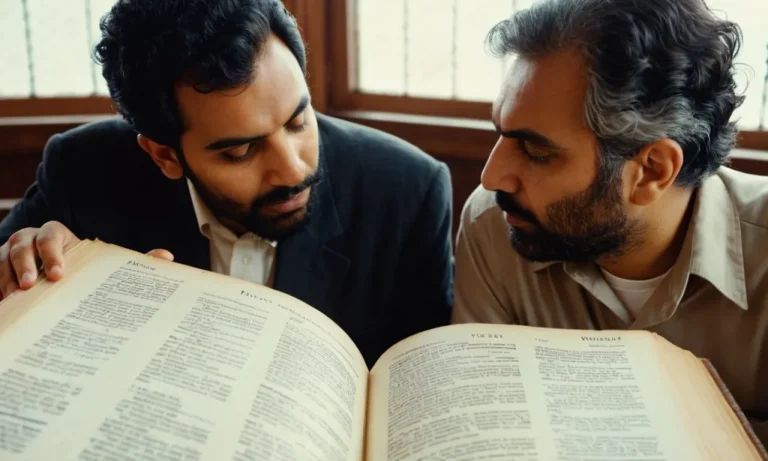Trusting God When You Don’T Understand: A Guide
“Trust in the Lord with all your heart and lean not on your own understanding” is easier said than done. When we face trials and can’t make sense of God’s plan, trusting Him fully requires faith and surrender.
If you’re looking for a quick answer: Remember that God sees the full picture while our understanding is limited. Trust that He is sovereign, good, and working all things for our growth and His glory.
In this comprehensive guide, we’ll explore what the Bible teaches about trusting God even when life doesn’t make sense. We’ll look at reasons why we struggle with trust, examples of biblical heroes who trusted without understanding, and most importantly – practical steps for growing our trust in God through difficult seasons.
Why We Struggle to Trust God’s Plan
Our desire for control and self-reliance
As humans, we often want to be in control and rely on our own abilities rather than trusting in God’s plan for our lives (Proverbs 3:5-6). We think we know best and that if we just try hard enough, we can make life work out the way we want. But ultimately, we are not in control – God is.
Until we learn to surrender our will to His, we will continue to struggle. As Corrie Ten Boom said, “Never be afraid to trust an unknown future to a known God.” When we walk by faith and not by sight (2 Corinthians 5:7), trusting that God sees the full picture and knows what is best even when we don’t understand, we can experience freedom and peace.
Focusing on our circumstances rather than God’s character
Often we base our trust in God on our circumstances, rather than focusing on His unchanging character. When circumstances are going well, it’s easy to trust that God is good. But when trials come, we feel confused and start to doubt.
The truth is that God is still the same loving, sovereign, wise, and good Father even in the midst of suffering. As Romans 8:28 reminds us, “And we know that in all things God works for the good of those who love him, who have been called according to his purpose.” God can use even the hardest circumstances for our growth and refinement if we keep trusting in Him.
He promises to be with us always (Deuteronomy 31:6), so we can confidently surrender all circumstances to Him.
Having a limited, human perspective
Our limited earthly perspective makes it hard to understand God’s bigger plan. As Isaiah 55:8-9 (NIV) says, “‘For my thoughts are not your thoughts, neither are your ways my ways,’ declares the Lord. ‘As the heavens are higher than the earth, so are my ways higher than your ways and my thoughts than your thoughts.
‘” We only see bits and pieces, but God sees the full picture. That’s why walking by faith and not sight is so key. We may not understand why God allows suffering in our lives or in the world, but we can trust His heart and character.
As Christina Fox writes, “Though the pain is great, the hurt deep, and the grief long, God uses it all for good.” If we trust Him through it all, He will redeem it for His glory and our good.
Learning to trust God more comes with time and experience. As we reflect on how He has proven Himself faithful time and again, our trust grows. When we surrender areas of our life to His control and see firsthand how He cares for us, our faith is strengthened.
God invites us to cast all our cares on Him because He cares for us (1 Peter 5:7). As we walk with Him through all seasons, we learn He truly is trustworthy and can be relied on fully even when we don’t understand His ways.
Biblical Examples of Trust Amid Confusion
Abraham – Trusting the promise of a son
Abraham was promised by God that he would become the father of a great nation, even though he and his wife Sarah were already very old and had no children (Genesis 12:1-7). This seemed impossible from a human perspective, but “Abraham believed the Lord, and he credited it to him as righteousness” (Romans 4:3).
His great trust and obedience led to the fulfillment of God’s promise in Isaac’s birth.
Joseph – Maintaining faith despite unfair treatment
Joseph went through intense suffering when his jealous brothers sold him into slavery in Egypt (Genesis 37). He was later falsely accused and imprisoned for years, but he continued to trust in God’s plan. Eventually he was vindicated and put in charge of Egypt’s food supply, saving many lives.
He told his brothers, “You intended to harm me, but God intended it for good” (Genesis 50:20).
Job – Trusting God’s goodness in suffering
Job lost all his wealth, possessions, and even his ten children in a single day (Job 1-2). To make matters worse, he then endured painful health afflictions. His friends told him these sufferings must be punishment for sin, but Job maintained, “Though he slay me, yet will I hope in him” (Job 13:15).
God later affirmed Job’s righteousness and trust in the midst of profound personal tragedy.
Habakkuk – Accepting God’s plan despite perplexity
The prophet Habakkuk cried out to God about violence and injustice he saw in Israel, wondering why God was not intervening (Habakkuk 1:1-4). God answered that He was raising up the ruthless Babylonians to enact judgment (1:5-11).
Habakkuk was terrified but chose to trust, saying, “Even though the fig trees have no blossoms, and there are no grapes on the vines…yet I will rejoice in the Lord” (3:17-18). His decision to trust God despite confusion was rooted in faith more than feelings or situational understanding.
Building Deeper Trust in God’s Sovereignty
Believing in God’s wisdom and love
When life feels out of control, it can be incredibly challenging to trust that God knows what He is doing. Yet studies show that believing in God’s infinite wisdom and unwavering love for us is key to finding peace.
As Romans 8:28 promises, somehow God works all things for the good of those who love Him. Rather than relying on our limited human logic, we can ask God to increase our faith in His perfectly crafted plans.
Accepting our limited understanding
Humility is essential to trusting God amidst confusion and hurt. We must acknowledge that our finite minds cannot fully grasp God’s intentions and ways. As Isaiah 55:8-9 conveys, God’s thoughts and ways are infinitely higher than our own. Yet God still invites us into a relationship with Him.
Therefore, we can boldly yet humbly ask Him to grant clarity, wisdom and comfort when we feel in the dark.
Seeking God over explanations
Trying to logically understand God’s confusing plans often leads to more frustration. Research shows that focusing on knowing God’s character builds trust better than demanding answers. We can pour out our hearts to God, then prayerfully ask Him to show us where He is at work.
This opens our eyes to see things from His perspective rather than desperately trying to justify troubles.
Focusing on God’s proven faithfulness
Remembering how God has guided us in the past cultivates confidence that He will continue doing so. As Lamentations 3:22-23 conveys, God’s lovingkindnesses never cease and His mercies never end. They are new every morning.
Reflecting on previous challenges overcome, prayers answered and blessings undeserved promotes gratitude. This fuels faith that if God has carried us this far, surely He will remain dependable.
Surrendering control to the Lord daily
Attempting to cling to control even amidst chaos is exhausting. But research reveals that surrendering control to God frees us from anxiety. As Matthew 11:28 says, Jesus invites us to give Him our heavy burdens so He can give rest.
Daily releasing frustrations, questions and demands to God relieves us. Then His peace guarding our hearts and minds arises from trusting Him to handle life’s incongruences.
Trusting God by Walking in Faith and Obedience
Obeying God amid uncertainty
When God calls us to obedience but the path forward seems unclear, it can be challenging to step out in faith. However, Scripture reminds us that God honors those who obey His voice, even when they don’t fully understand where He is leading (John 14:21).
As we follow His commands one step at a time, He faithfully guides our way (Proverbs 3:5-6).
Moving ahead in faith without clear guidance
God doesn’t always give us a detailed roadmap for our lives. Sometimes He asks us to follow Him without knowing the final destination. This requires humility and courage as we let go of our need to control.
However, we can trust that God sees the full picture and He lovingly leads us down the very best path (Jeremiah 29:11). As we take bold steps of faith, we will discover incredible things we never could have orchestrated on our own!
Making decisions based on Godly wisdom
Seeking wisdom from God’s Word is vital when making decisions without clear direction (Psalms 119:105). Scripture gives us principles for guidance, such as considering the counsel of other believers (Proverbs 15:22).
We can also follow biblical examples of those who patiently waited on God for instructions (Acts 1:4). As we pray for discernment and tune our ear to His Spirit, God promises to impart wisdom generously when we ask in faith (James 1:5).
Being patient for God’s timing and will
When the way ahead seems uncertain, our natural response is to charge ahead of God trying to make things happen. However, He tells us His thoughts and ways are higher than ours (Isaiah 55:8-9). He sees the full picture and knows the very best timing for events to unfold.
Rather than relying on our limited perspective, the wise choice is to wait patiently on the Lord for His clear direction and empowerment (Psalms 27:14). He promises to renew our strength when we put our hope in Him (Isaiah 40:31).
Conclusion
Trusting God completely, especially when life doesn’t make sense, requires humility and faith. By focusing on His loving, sovereign character rather than our desire for control, we can accept our limited perspective.
We must choose daily to surrender our need to understand everything, obey God despite fears or confusion, and keep walking in faith that He is good and working all things for our growth and His glory.








